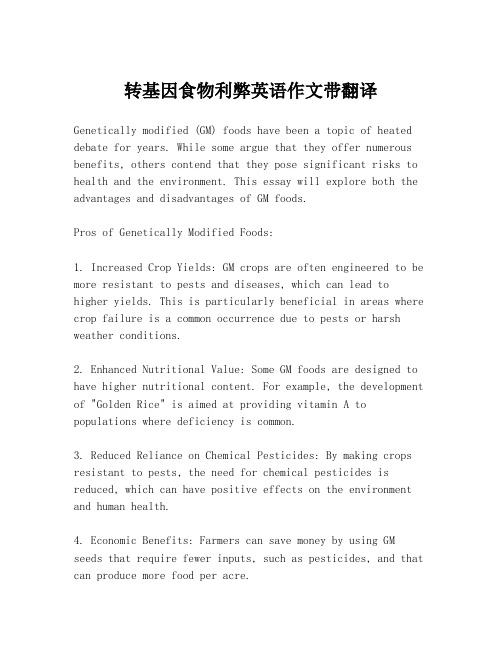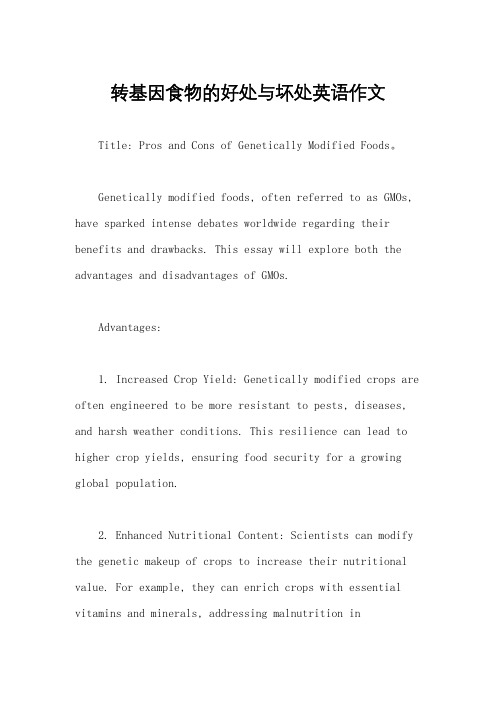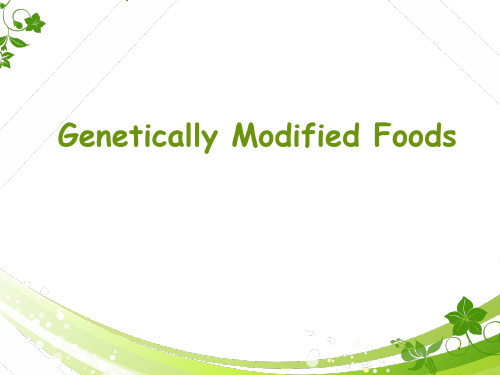转基因食品优缺点英文
转基因食品利弊作文英语

转基因食品利弊作文英语英文回答:Genetically modified (GM) foods, also referred to as genetically engineered (GE) foods, have sparked considerable debate due to their potential benefits and risks.Benefits of GM Foods:Increased crop yields: GM crops can be engineered to resist pests and diseases, reducing crop losses and increasing overall yield. This can help address food security concerns in developing countries.Improved nutritional value: GM foods can be enhanced to contain higher levels of vitamins, minerals, and other nutrients. This has the potential to combat malnutrition and improve public health.Resistance to environmental stressors: GM crops can be engineered to tolerate drought, heat, and other environmental stressors. This can increase agricultural productivity in challenging environments and reducereliance on synthetic fertilizers and pesticides.Risks of GM Foods:Health concerns: Critics argue that the long-term health effects of consuming GM foods are not fully understood. Concerns include potential allergies, increased toxicity, and antibiotic resistance due to the insertion of foreign genes.Environmental impact: GM crops can cross-pollinate with non-GM varieties, potentially introducing novel genes into natural ecosystems. This raises concerns about unintended consequences on biodiversity and gene flow.Economic issues: The development and commercialization of GM seeds can involve significant intellectual property rights and control by biotechnology companies. This cancreate concerns about farmer autonomy and market competition.Weighing the Benefits and Risks:The debate over GM foods is complex and requirescareful consideration of the potential benefits and risks. While GM foods have the potential to address food security and improve nutrition, concerns about health and environmental impacts must be thoroughly evaluated through rigorous scientific research and oversight.中文回答:转基因食品利弊。
转基因食物利弊英语作文带翻译

转基因食物利弊英语作文带翻译Genetically modified (GM) foods have been a topic of heated debate for years. While some argue that they offer numerous benefits, others contend that they pose significant risks to health and the environment. This essay will explore both the advantages and disadvantages of GM foods.Pros of Genetically Modified Foods:1. Increased Crop Yields: GM crops are often engineered to be more resistant to pests and diseases, which can lead to higher yields. This is particularly beneficial in areas where crop failure is a common occurrence due to pests or harsh weather conditions.2. Enhanced Nutritional Value: Some GM foods are designed to have higher nutritional content. For example, the development of "Golden Rice" is aimed at providing vitamin A to populations where deficiency is common.3. Reduced Reliance on Chemical Pesticides: By making crops resistant to pests, the need for chemical pesticides is reduced, which can have positive effects on the environment and human health.4. Economic Benefits: Farmers can save money by using GM seeds that require fewer inputs, such as pesticides, and that can produce more food per acre.Cons of Genetically Modified Foods:1. Potential Health Risks: There are concerns that GM foods may cause allergic reactions or other health problems, although scientific consensus has not yet fully established these risks.2. Environmental Impact: Critics argue that GM crops can crossbreed with wild plants, leading to the spread ofmodified genes in the wild, which could have unforeseen ecological consequences.3. Monoculture and Loss of Biodiversity: The widespread adoption of GM crops can lead to a reduction in agricultural biodiversity, as farmers may choose to grow only a few GM varieties.4. Corporate Control: Many GM seeds are patented by large corporations, which can lead to increased costs for farmers and a dependency on these companies for seeds.In conclusion, while GM foods offer the potential for increased food security and enhanced nutrition, there arevalid concerns regarding their safety and environmental impact. It is crucial for ongoing research and transparent labeling to ensure that the benefits of GM foods can be realized without compromising human health or the environment.翻译:转基因(GM)食品多年来一直是激烈争论的话题。
转基因食品的利与弊英语作文

转基因食品的利与弊英语作文Title: Pros and Cons of Genetically Modified Foods。
Genetically modified foods (GM foods) have been a subject of debate for quite some time. While proponents argue for their potential to address food security and nutritional deficiencies, opponents raise concerns about their safety and long-term impacts on human health and the environment. In this essay, we will delve into the advantages and disadvantages of genetically modified foods.Advantages:1. Increased Crop Yield: One of the primary benefits of GM foods is their potential to increase crop yield. Through genetic modification, crops can be engineered to resist pests, diseases, and adverse environmental conditions, leading to higher productivity per acre of land.2. Enhanced Nutritional Value: Genetic engineeringenables the enrichment of crops with essential nutrients, such as vitamins and minerals. For example, Golden Rice, engineered to produce beta-carotene, addresses vitamin A deficiency in regions where rice is a staple food.3. Reduced Dependency on Pesticides: GM crops can be engineered to possess inherent resistance to pests and diseases, thereby reducing the need for chemical pesticides. This not only minimizes environmental pollution but also lowers production costs for farmers.4. Extended Shelf Life: Some genetically modifiedfruits and vegetables exhibit traits that prolong theirshelf life, reducing food wastage during storage and transportation. This is particularly advantageous in addressing hunger and malnutrition in remote areas.5. Environmental Sustainability: Certain GM crops are designed for enhanced nitrogen fixation or drought tolerance, reducing the need for excessive irrigation and fertilizers. This promotes sustainable agriculturepractices and conserves natural resources.Disadvantages:1. Health Concerns: Opponents of GM foods express apprehensions regarding their potential long-term health effects on humans. There are concerns about allergic reactions, antibiotic resistance, and unforeseen consequences of genetic modifications that may not manifest immediately.2. Environmental Risks: The cultivation of GM crops may pose environmental risks, such as the unintentional spread of genetically modified organisms (GMOs) to wild plant populations, disrupting ecosystems and biodiversity. Additionally, the emergence of superweeds and superbugs resistant to GM crop traits is a growing concern.3. Economic Implications: The dominance of GM crops in agricultural systems can lead to economic disparities, as small-scale farmers may face challenges accessing expensive GM seeds and technologies. Moreover, the patenting of genetically modified seeds by biotechnology corporationsraises issues of intellectual property rights and monopolistic control over agricultural production.4. Loss of Traditional Varieties: The widespread adoption of GM crops has led to the displacement of traditional crop varieties adapted to local environments and cultural practices. This loss of agricultural biodiversity diminishes resilience to pests, diseases, and climate change.5. Ethical Dilemmas: Genetically modifying organisms raises ethical questions regarding the manipulation of nature and the commodification of life. Concerns about corporate control over food production, transparency in labeling GM products, and the right of consumers to make informed choices are central to the ethical debate surrounding GM foods.In conclusion, genetically modified foods offer potential benefits in terms of increased crop yield, enhanced nutritional value, and environmental sustainability. However, they also pose significantchallenges and risks, including health concerns, environmental impacts, economic disparities, loss of biodiversity, and ethical dilemmas. As the debate continues, it is essential to weigh the advantages and disadvantagesof GM foods while ensuring robust regulatory frameworks and transparency in decision-making processes.。
转基因食物的好处与坏处英语作文

转基因食物的好处与坏处英语作文Title: Pros and Cons of Genetically Modified Foods。
Genetically modified foods, often referred to as GMOs, have sparked intense debates worldwide regarding their benefits and drawbacks. This essay will explore both the advantages and disadvantages of GMOs.Advantages:1. Increased Crop Yield: Genetically modified crops are often engineered to be more resistant to pests, diseases, and harsh weather conditions. This resilience can lead to higher crop yields, ensuring food security for a growing global population.2. Enhanced Nutritional Content: Scientists can modify the genetic makeup of crops to increase their nutritional value. For example, they can enrich crops with essential vitamins and minerals, addressing malnutrition invulnerable populations.3. Reduced Need for Pesticides: GMOs can be engineered to produce their pesticides, reducing the need for external chemical pesticides. This not only lowers production costs for farmers but also minimizes the environmental impact associated with pesticide use.4. Extended Shelf Life: Some genetically modified crops have an extended shelf life due to improved resistance to spoilage and rotting. This trait can reduce food wastage, benefiting both producers and consumers.5. Drought and Salinity Tolerance: Genetic engineering can confer traits such as drought and salinity tolerance to crops, enabling them to thrive in arid or saline environments where traditional varieties would fail. This could be crucial for agriculture in regions prone to water scarcity.Disadvantages:1. Potential Health Risks: One of the main concerns surrounding GMOs is their potential impact on human health. Some critics argue that consuming genetically modified foods could lead to allergic reactions, antibiotic resistance, or other unforeseen health consequences.2. Environmental Concerns: GMOs may pose risks to biodiversity and ecosystem health. For example, genetically modified crops could crossbreed with wild relatives, leading to the spread of modified genes in natural habitats and disrupting ecosystems.3. Socio-Economic Issues: The widespread adoption of GMOs could exacerbate socio-economic inequalities in agriculture. Large biotechnology companies often hold patents on genetically modified seeds, leading to concerns about farmer dependence, seed monopolies, and increased costs for small-scale farmers.4. Ethical Considerations: There are ethical concerns surrounding the genetic modification of living organisms. Critics argue that altering the genetic makeup of plantsand animals interferes with the natural order and raises moral questions about the commodification of life.5. Lack of Long-Term Studies: Despite decades of research, there is still limited long-term data on the effects of GMO consumption on human health and the environment. This uncertainty contributes to public skepticism and calls for more rigorous testing and regulation of GMOs.In conclusion, genetically modified foods offer several potential benefits, including increased crop yield, enhanced nutritional content, and reduced pesticide use. However, they also raise significant concerns regarding health risks, environmental impacts, socio-economic issues, and ethical considerations. It is essential to carefully weigh these factors and engage in informed decision-making when it comes to the production and consumption of GMOs.。
雅思写作大作文思路 转基因食物的优势与劣势 advantages and disadvantages of genetically.doc

雅思写作大作文思路转基因食物的优势与劣势 advantages and disadvantages of genetically-modified foods今天我们雅思写作大作文思路的文章来研究下转基因食品的优势与劣势。
最近几年,关于转基因食物的争论一直很火热。
反对派以崔永元为首,认为转基因食物不自然,长期食用会对人类的基因造成影响。
一些企业也利用人们的这一恐惧,号称自己生产的食物中不含任何转基因的成分。
但是,转基因食物有着其不可忽视的优势。
它们往往产量更大,种植起来更容易,并且成长周期更短。
可以满足更多人的需求。
小编收集了一些关于转基因食物的素材,以供大家参考。
转基因食物的优势 Advantages of genetically-modified foodFarmers can produce crops that grow bigger and faster农民可以生产出长得更大更快的作物。
Some GM crops are more resistant to disease or insects一些转基因作物对疾病和昆虫拥有更高的抗性。
This could be important for food production in developing countries这对于发展中国家的食物生产非常重要。
Faster growing cereals, fruit, and vegetables will mean more profit生长更快的谷物、水果和蔬菜意味着更高的利润。
GM foods can be modified to look perfect转基因食物可以被改良,以使其看起来很完美。
They may be more attractive to customers它们可能对消费者更加有吸引力。
转基因食物的劣势 Advantages of genetically-modified foodThere may be risks involved in the genetic engineering of foods.转基因食物中可能包含着一些风险。
转基因食品的利与弊 英语作文

转基因食品的利与弊英语作文英文回答:As for the pros of genetically modified (GM) foods, there are a few points to consider. First of all, GM foods can help to increase crop yields, which is essential for feeding the growing global population. For example, scientists have developed GM crops that are resistant to pests and diseases, allowing farmers to produce more food on the same amount of land. This can help to reduce food shortages and improve food security in many parts of the world.Another advantage of GM foods is that they can be engineered to have a longer shelf life, which can reduce food waste. For instance, GM tomatoes have been modified to ripen more slowly, leading to less spoilage and longer storage times. This can be particularly beneficial in developing countries where access to refrigeration and proper storage facilities is limited.Furthermore, GM foods have the potential to be more nutritious and healthier. Scientists have been able to enhance the nutritional content of certain crops, such as adding more vitamins and minerals to rice. This can be especially beneficial for populations that suffer from malnutrition and dietary deficiencies.On the other hand, there are also some drawbacks to consider when it comes to GM foods. One of the main concerns is the potential for unintended harm to the environment and human health. For example, there is a fear that GM crops could crossbreed with wild plants, leading to the spread of modified genes into natural ecosystems. Additionally, there are worries about the long-term effects of consuming GM foods, as the full impact on human healthis not yet fully understood.Another drawback is the potential for corporate control over the food supply. Many GM seeds are patented by biotechnology companies, which can lead to a monopoly on the market and limited options for farmers. This can havenegative implications for small-scale farmers who may become dependent on a single company for their seeds and agricultural inputs.In conclusion, GM foods have the potential to address some of the world's food security and nutrition challenges, but they also come with potential risks to the environment and human health, as well as concerns about corporate control. It is important to carefully weigh the pros and cons of GM foods and consider the ethical, social, and environmental implications before fully embracing this technology.中文回答:说到转基因食品的利与弊,有一些要考虑的观点。
转基因食品优缺点英文

GM foods' drawbacks
A number of studies have indicated that the GM foods is impaired for mammals the immune fop pests, anti-virus. Improve the water resistance of agricultural products, e xtend the freshness. Get rid of the season, the influence of the climate.
to other technologies in traditional plant and animal breeding.
View
As far as I am concerned, the GM foods can reach som e effects people want to achieve to,but at the same tim e,it also increase and accumulate the poison in the food.
The goals of the human need to GM organisms for dir ect food or as raw material processing production of foo d is genetically modified food.
GM and Non-GM contrast
Positive comments
Gpaul goettlich's view First,it can make the food contain more nutrition. Then,it can improve farming productivity in food sho
转基因食品的优缺点 英语作文

转基因食品的优缺点英语作文英文回答:Advantages of Genetically Modified Foods (GMOs)。
Increased crop yields: GMOs can be engineered toresist pests and diseases, leading to higher crop yields. This can help to ensure food security for a growing population.Reduced pesticide use: GMOs can be engineered to produce their own pest-resistant proteins, eliminating the need for chemical pesticides. This can reduce environmental pollution and the associated health risks.Enhanced nutritional value: GMOs can be engineered to contain higher levels of essential nutrients, such as vitamins, minerals, and antioxidants. This can improve public health and reduce the risk of chronic diseases.Resistance to harsh environmental conditions: GMOs can be engineered to tolerate drought, salinity, and extreme temperatures. This can help to expand crop production into marginal lands and increase resilience to climate change.Reduced food waste: GMOs can be engineered to have longer shelf lives and resistance to bruising and spoilage. This can reduce food waste and improve food availability.Disadvantages of GMOs.Potential risks to human health: There are concernsthat GMOs may have unintended consequences for human health, such as allergies, immune system disorders, or toxicity. However, rigorous scientific studies have not found any conclusive evidence of harm.Environmental concerns: GMOs may have ecological impacts, such as the development of herbicide-resistant weeds or the unintended transfer of genes to wild species. There are also concerns about the potential for GMOs to reduce biodiversity.Ethical and social concerns: Some people have ethicalor religious objections to the genetic modification of food. Others are concerned about the potential for GMOs to be controlled by large corporations and the impact on small-scale farmers.Lack of long-term safety data: GMOs are a relatively new technology, and there is limited long-term data ontheir safety. Some scientists argue that more research is needed before GMOs can be widely adopted.Labeling and transparency: There is ongoing debate about the need for GMOs to be labeled so that consumers can make informed choices.中文回答:转基因食品的优点。
- 1、下载文档前请自行甄别文档内容的完整性,平台不提供额外的编辑、内容补充、找答案等附加服务。
- 2、"仅部分预览"的文档,不可在线预览部分如存在完整性等问题,可反馈申请退款(可完整预览的文档不适用该条件!)。
- 3、如文档侵犯您的权益,请联系客服反馈,我们会尽快为您处理(人工客服工作时间:9:00-18:30)。
a
1
What's GM foods GM and Non-GM contrast GM foods' advantages GM foods' drawbacks View
a2ຫໍສະໝຸດ What's GM foods
Genetically modified (GM) food, is the use of biologica l technology,transfer some biological gene to other speci es, change its character, nutritional quality.
a
5
Positive comments
Gpaul goettlich's view First,it can make the food contain more nutrition. Then,it can improve farming productivity in food sho
rtages places. And he thinks GM foods
Potatoes
Tomatoes
a
Beans
4
GM foods' advantages
Increase crop yield per unit area. Reduce the production cost. Through transgenic technology can enhance the ability
a
7
Negative comments
Irina V. Ermakova's view Find that GM food soya could have a negative influenc
e on the offsprings of wistar rats.
Gideon Lack's view Genetically modified technology is more risk compared
to other technologies in traditional plant and animal breeding.
a
8
View
As far as I am concerned, the GM foods can reach som e effects people want to achieve to,but at the same tim e,it also increase and accumulate the poison in the food.
The goals of the human need to GM organisms for dir ect food or as raw material processing production of foo d is genetically modified food.
a
3
GM and Non-GM contrast
It's more studies that the test with the hamster after eating genetically modified food, to its third generation, it's extinct.
Affect other species by genetic spread. Cause allergies.
a
9
thanks!
of crop pests, anti-virus. Improve the water resistance of agricultural products, extend the freshness. Get rid of the season, the influence of the climate.
Now,there are some common GM foods in china ,such as beans,rice,tomatoes,potatoes,corn etc.
The emergence of GM foods is unavoidable, we can't blindly reject it.With the development of science and p olicy, I believe that one day people can safely eat it.
can effectively ease Global hunger problem.
a
6
GM foods' drawbacks
A number of studies have indicated that the GM foods is impaired for mammals the immune function.
